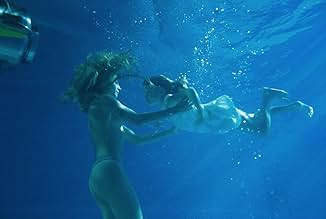Various lives converge on an isolated island, all connected by an author whose novel has become inextricably entwined with his own life.Various lives converge on an isolated island, all connected by an author whose novel has become inextricably entwined with his own life.Various lives converge on an isolated island, all connected by an author whose novel has become inextricably entwined with his own life.
- Awards
- 11 wins & 18 nominations total
María Álvarez
- Enfermera
- (as María Alvarez)
Javier Coromina
- Camarero Chiringuito
- (as Javier Corominas)
Alesandra Álvarez
- Luna 1 año
- (as Alesandra Alvarez)
José Ferreira
- Emplastro
- (uncredited)
- Director
- Writer
- All cast & crew
- Production, box office & more at IMDbPro
Featured reviews
10Core242
The earlier film by Julio Médem (Lovers of the Arctic Circle) is a prelude to the kind of cinematography that this Spanish film director/writer presents here. I have read most of the other comments, but they don't do justice to it, mainly because of the lack of understanding the original tongue of this film. The screenplay is excellent, full of metaphors and a rich use of very carefully chosen words. People who consider this film just an excuse for depicting sex scenes as the highlight of the movie are pretty much clueless. It is more than that, it is the complex storytelling that tangles the characters in this movie and the way that is told. Compelling and breath-taking. A must see.
Stories told in a so-called "magical realism" style like this film can be very tricky. The story and the characters need to be very strong to sustain all the twists of the plot and I don't think this was pulled off here. I was disappointed, as I'd enjoyed Medem's previous film Los Amantes del Circulo Polar, where the passionate love story seemed a lot more genuine and the tragic ending seemed to fit better with the theme of fate playing with people's lives than Lucia y el sexo's tragic-to-happy contortions.
Also, while the female characters were all charming and sexy, the male roles were really poor and unconvincing. What on earth did Lucia see in Lorenzo? There isn't enough to justify her endurance and patience with him. Their whole love story seems artificial from the inception, it seems there was too much work on the symbolism of their relationship - the tormented writer and storyteller, the reader and savior (Lucia as a ray of sunshine) - rather than on the real intensity of feeling between two people. The sex scenes are too stylish and sleek to be really passionate. Everyone is good looking and well dressed, they live in nice apartments, exist in a bubble where the society around them doesn't seem to affect them, this is obviously purposefully so and ideally you wouldn't mind that lack of realism if the story was engrossing enough, which it isn't.
The entire plot seems to revolve around the concept of the ability to deal with tragic fateful events by rewriting, literally and metaphorically, one's own life story. But the final optimism comes across as too artificial. The plot does not resolve the fate of the child Luna, Lorenzo's daughter. The tragedies seem more like a prop, a trick to demonstrate how love can conquer guilt, remorse and failure. They're not given enough weight. People slash their wrists or throw themselves under buses easier than they cry, then we're supposed to believe they can just forget and forgive and live happily ever after.
The director says he wanted to make everything "light" in this film, after the experience with the previous one. But I think he overdid it! There is a bit too much of the French 'Amelie' in Lucia's character, she is more like a beautiful fairy than a real person. Elena, too, is more a symbol of caring and nurturing (motherhood, cooking, taking care of Lucia) than a real grieving mother. Her lack of anger and bitterness is not very believable. The whole escapist symbol of the floating island becomes annoying after a while. It functions on the characters like a drug inducing apathy and oblivion, more of a way of avoiding pain than confronting it. But it's not that, it's the way in which it's presented and wrapped up at the end that really disappoints - too fancy and too abstract to really work.
It's not a bad film. It's full of eye candy - the spectacularly gorgeous Paz Vegas, the island, the photography - and it is well directed and well acted overall. But without all that, the story itself wouldn't really be worth much.
Also, while the female characters were all charming and sexy, the male roles were really poor and unconvincing. What on earth did Lucia see in Lorenzo? There isn't enough to justify her endurance and patience with him. Their whole love story seems artificial from the inception, it seems there was too much work on the symbolism of their relationship - the tormented writer and storyteller, the reader and savior (Lucia as a ray of sunshine) - rather than on the real intensity of feeling between two people. The sex scenes are too stylish and sleek to be really passionate. Everyone is good looking and well dressed, they live in nice apartments, exist in a bubble where the society around them doesn't seem to affect them, this is obviously purposefully so and ideally you wouldn't mind that lack of realism if the story was engrossing enough, which it isn't.
The entire plot seems to revolve around the concept of the ability to deal with tragic fateful events by rewriting, literally and metaphorically, one's own life story. But the final optimism comes across as too artificial. The plot does not resolve the fate of the child Luna, Lorenzo's daughter. The tragedies seem more like a prop, a trick to demonstrate how love can conquer guilt, remorse and failure. They're not given enough weight. People slash their wrists or throw themselves under buses easier than they cry, then we're supposed to believe they can just forget and forgive and live happily ever after.
The director says he wanted to make everything "light" in this film, after the experience with the previous one. But I think he overdid it! There is a bit too much of the French 'Amelie' in Lucia's character, she is more like a beautiful fairy than a real person. Elena, too, is more a symbol of caring and nurturing (motherhood, cooking, taking care of Lucia) than a real grieving mother. Her lack of anger and bitterness is not very believable. The whole escapist symbol of the floating island becomes annoying after a while. It functions on the characters like a drug inducing apathy and oblivion, more of a way of avoiding pain than confronting it. But it's not that, it's the way in which it's presented and wrapped up at the end that really disappoints - too fancy and too abstract to really work.
It's not a bad film. It's full of eye candy - the spectacularly gorgeous Paz Vegas, the island, the photography - and it is well directed and well acted overall. But without all that, the story itself wouldn't really be worth much.
This Spanish film has an unusual look and feel and dares to take chances in the way that it mixes fantasy and reality. The result is an interesting film, which is often confusing and frustrating. I'm sure that this was not entirely accidental and that the filmmakers wanted to keep the audience in a state of disorientation. Nevertheless, the convolutions of the story appear to serve no other purpose than to keep us off balance.
The films biggest sin is the scene in the middle of the film where the daughter Luna opens the bedroom door. The following event is presented in such a way that we are left guessing as to what has just happened. There's no reason for withholding it, except the misguided idea that lack of clarity is artistically valuable. I think that despite it's flaws, this film shows a great vibrancy and energy.
People talk a lot about the sex scenes. The film doesn't have much to say about sex and it certainly isn't about sex. Nevertheless, the scenes do not seem tacked on for the sake of it and, in an era when Hollywood seems to be gripped by a new puritanism, it's refreshing to see a frank depiction of what is, after all, an important aspect of the relationship between these characters.
The films biggest sin is the scene in the middle of the film where the daughter Luna opens the bedroom door. The following event is presented in such a way that we are left guessing as to what has just happened. There's no reason for withholding it, except the misguided idea that lack of clarity is artistically valuable. I think that despite it's flaws, this film shows a great vibrancy and energy.
People talk a lot about the sex scenes. The film doesn't have much to say about sex and it certainly isn't about sex. Nevertheless, the scenes do not seem tacked on for the sake of it and, in an era when Hollywood seems to be gripped by a new puritanism, it's refreshing to see a frank depiction of what is, after all, an important aspect of the relationship between these characters.
(8/10) Refreshing, delightful, sexy. moving and thought-provoking movie from Spain. Not really porn (as the title might suggest) although there is some very artistic explicitness. It is movies like this one that remind us that European cinema can scale the emotional dilemmas and mountains of a story where other films look at a storyline in terms of physical developments. Lucia, a young waitress in Madrid, falls completely in love with a writer. After a period of blissful togetherness, something from his past pulls him in two directions. We are caught up in his moral dilemma, of not wanting to lose the wonderful gift he has found and yet not wanting to be untrue to himself. The semi-autobiographical novel he is writing pulls together the story and the emotions and hopes of the characters and introduces ideas that enable them to heal some of their hurt. A central idea is that of finding a hole (symbolically on the sandy beach) where, after reaching the end of the story, you can jump back into the middle. That way you can try an make things turn out better ("If you give me time", says Lorenzo, Lucia's boyfriend.) A more mature and rounded work than the Director's earlier "Lovers of the Arctic Circle", Sex and Lucia combines wonderful acting, a great story, innovative cinema and spine-tingly beautiful photography. One of my favourite films of the year.
This is one of the better structured movies ever put to screen. It's as complex as Lynch's Lost Highway, but that only adds to the experience. A non-linear structure (in time and space) is applied and Lucia y el Sexo blurs the line between reality and imagination.
Basically, it's like Mulholland Drive: Most of what we see is a dream, imagination. Only a relatively small part did really happen. But this goes one step further: What part is in the eye of the beholder here, because little clues are given so the mystery format is only used to keep us entertained at a basic level.
A writer is the center here. Some parts of his life are probably true (trouble at home, sickness), others are ambiguous, others are certainly imagined. He is in the meta-story, but also places himself in threads in the other stories that come from his imagination. His imagination is formed by applying smaller and larger events (meeting a person at a party, seeing someone in front of the house) in his personal life to his fantasies. His erotic fantasies explain the title, as sex is one of the characters of the story. One of the story lines is again about his script read on the island by one of his imagined characters. Writing the story and telling the story is done simultaneously. As he becomes sick, the characters become helpless in the story. Overall it helps a lot if you keep imagining that you're watching imagined characters being manipulated by the writer. This combines meta-story and story, real with imagination, weaving several threads in a complicated web of story lines. In the end, it is made clear that the story doesn't end but starts again halfway, giving further evidence that viewers can use their imagination at random on this and create their own story out of it.
The meta-story is interesting, but by mixing it with the story itself we see the real story as what it is, a writing trick with imagined characters. That unfortunately diminishes the emotions a movie tries to convey. We're merely watching how a movie is structured, with the imagined story not having the usual dramatic impact.
It's remarkable that so many people are offended by the sex scenes, as it's already in the title. Do they also complain about the presence of aliens in Alien? I found the sex scenes to be made with some honesty; and at least they didn't even shy away of male nudity.
Basically, it's like Mulholland Drive: Most of what we see is a dream, imagination. Only a relatively small part did really happen. But this goes one step further: What part is in the eye of the beholder here, because little clues are given so the mystery format is only used to keep us entertained at a basic level.
A writer is the center here. Some parts of his life are probably true (trouble at home, sickness), others are ambiguous, others are certainly imagined. He is in the meta-story, but also places himself in threads in the other stories that come from his imagination. His imagination is formed by applying smaller and larger events (meeting a person at a party, seeing someone in front of the house) in his personal life to his fantasies. His erotic fantasies explain the title, as sex is one of the characters of the story. One of the story lines is again about his script read on the island by one of his imagined characters. Writing the story and telling the story is done simultaneously. As he becomes sick, the characters become helpless in the story. Overall it helps a lot if you keep imagining that you're watching imagined characters being manipulated by the writer. This combines meta-story and story, real with imagination, weaving several threads in a complicated web of story lines. In the end, it is made clear that the story doesn't end but starts again halfway, giving further evidence that viewers can use their imagination at random on this and create their own story out of it.
The meta-story is interesting, but by mixing it with the story itself we see the real story as what it is, a writing trick with imagined characters. That unfortunately diminishes the emotions a movie tries to convey. We're merely watching how a movie is structured, with the imagined story not having the usual dramatic impact.
It's remarkable that so many people are offended by the sex scenes, as it's already in the title. Do they also complain about the presence of aliens in Alien? I found the sex scenes to be made with some honesty; and at least they didn't even shy away of male nudity.
Did you know
- TriviaSome of the most sexual explicit content was made by doubles, not by the main actors.
- GoofsA full moon between two buildings is shown during midday when Lorenzo meets his daughter Luna for the first time - which is astronomically impossible.
- Crazy creditsCredits scroll in the opposite direction.
- Alternate versionsThe US cut removes most of the frontal nudity and runs approximately 2 minutes shorter.
- ConnectionsFeatured in Brows Held High: Room in Rome (2013)
- SoundtracksUn Rayo de Sol
Written by Daniel Vangarde (as Vangarde), Claude Carrère and Amado Jaén (as Jaen)
(c) Bleu Blanc Rouge Editions Soc - Editions Productions Zagora
Ediciones Musicales Clipper's, S.L.
Details
Box office
- Gross US & Canada
- $1,594,779
- Opening weekend US & Canada
- $47,591
- Jul 14, 2002
- Gross worldwide
- $7,640,680
- Runtime
- 2h 8m(128 min)
- Color
- Sound mix
- Aspect ratio
- 2.35 : 1
Contribute to this page
Suggest an edit or add missing content




























